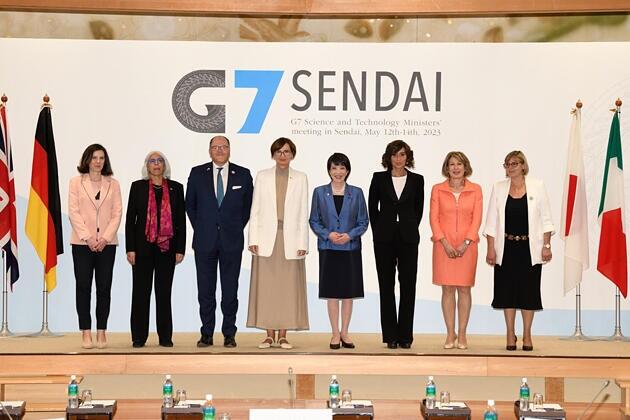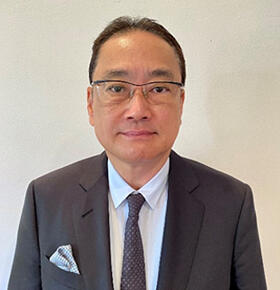In the weeks preceding the G7 Hiroshima Summit (May 19−21), a series of G7 Ministers' Meetings on various topics were held around Japan. After the Hiroshima Summit, six more ministers' meetings will be organized before the end of the year. The G7 Science and Technology Ministers' Meeting held in Sendai on May 12−14 was one such G7 ministerial meeting.
Japan attaching importance to international science and technology cooperation under the framework of the G7
As for G7-related ministers' meetings, there are those held annually, such as the Foreign Ministers Meeting and the Finance Ministers and Central Bank Governors' Meeting, while there are others held at the initiative of the chair country for that year. In the history of developed countries' summits dating back to 1975, the first G7 Science and Technology Ministers' Meeting was held in Okinawa in 2008, when Japan presided over the G8 Hokkaido Toyako Summit. At the time, the G8 Science and Technology Meeting in Okinawa, which included Russia1, was chaired by Fumio Kishida, then Minister of State for Science and Technology Policy, current Prime Minister of Japan.
In the 15 years since then, G7 (G8) Science and Technology Ministers' Meetings have been held nine times, including this year's Sendai meeting. This ministerial meeting has been held in every year that Japan has held the summit presidency, including the 2016 G7 Science and Technology Ministers' Meeting in Tsukuba, Ibaraki. This can be seen as a demonstration of Japan's strong emphasis on science and technology as one of the major themes in the G7.
G7 Science and Technology Ministers' Meeting held for the third time in Japan
The G7 Science and Technology Ministers' Meeting in Sendai was chaired by Sanae Takaichi, Minister of State for Science and Technology Policy of the Cabinet Office and attended by ministerial-level officials or their deputies from G7 countries and the EU. As highlighted in several news reports covering the event, it was a pleasant surprise to see those seven of the eight attendees, including Takaichi, were women2.

(provided by the Cabinet Office)

(provided by the Cabinet Office)
The Sendai Ministers' Meeting was organized under the main theme of "Realization of an open and evolutional research ecosystem based on trust," with discussions along three main agenda items: "Respect for freedom and inclusiveness in scientific research and promotion of open science," "Promotion of trustworthy scientific research through research security and research integrity measures," and "International cooperation in science and technology to solve global issues." The "Communiqué" together with "Annexes" (reports on activities of working groups, and others) issued as the outcome document after the Ministers' Meeting also followed this agenda structure. The summary of the Sendai Ministers' Meeting and the set of its outcome documents are available on the Cabinet Office website3.
The initial draft of the outcome document was presented by the summit chair, Japan, to the other G7 members for consideration approximately six months prior to the ministerial meeting. It was finalized through the Senior Officials' Meeting and e-mail exchanges. Typically, the volume of the document will increase in the process of reflecting proposals and comments from each member country, and the final document is significantly longer than the first draft. During the coordination process, the member countries tackled some controversial issues. Issues on which consensus could not be reached have been dropped from the document. It is the role for the presidency to coordinate various issues to ensure that an agreement can be reached on a consensus basis as much as possible, thus providing a chance for them to show their leadership. This time, the wording in the outcome document was not carried over to the main ministerial meeting, and the Communiqué was released smoothly and immediately at the closing of the main meeting.
It is not always easy to understand all the key points of the ministerial meeting simply from the reading of the final documents of considerable length. This article attempts to delve into the key points of the Sendai Ministers' Meeting, building on some valuable background information provided by Mr. Osamu Aruga, Director for International Affairs at the Secretariat for Science, Technology and Innovation, Cabinet Office, who was directly in charge of the preparation and organization of the Sendai Ministers' Meeting.
Promotion of open science
The first major agenda item, the promotion of open science, is one of the key themes that has become a major trend in international discussions on science and technology research. It was at the G7 Science and Technology Ministers' Meeting in Tsukuba, Ibaraki, in 2016, under Japan's previous G7 Presidency, when this topic was first officially taken up in the G7 Science and Technology Ministers' Meeting process and the establishment of a Working Group (WG) on this topic was decided upon. Japan is currently co-chairing this WG with the EU.
The Sendai Ministerial Communiqué firstly calls for cooperation to expand open science through equitable dissemination of research results, referring to principles such as openness, freedom, inclusiveness and academic freedom, research integrity, and protection of privacy and intellectual property.
A more specific issue is the question of how to expand free and less costly access to research results and data. The G7 has already agreed on the basic direction of aiming for more open access ("The G7 also supports immediate open and public access to government-funded scholarly publications and scientific data and supports the endeavors of the scientific community to address challenges in scholarly publishing for broader sharing of appropriate scientific outputs." [Excerpt from the Sendai Communiqué]). The member countries are advancing discussion of specific measures to realize "immediate open and public access," based on their respective circumstances (e.g., publishing internationally prestigious academic journals) and institutional differences.
In Japan, concrete measures are also being discussed considering these international trends toward open access (OA). Regarding the publication of academic research results, in the near future, the so-called "Green OA"—in which the author's final draft (the final draft before formal publication in an academic journal) is made public in institutional repositories, such as universities—is being promoted and support for researchers to this end is also being considered. The specific institutional design will be made concrete in the elaboration of the Integrated Innovation Strategy 2023 of the Government as well as a national policy for OA.
Importance of Science Communication
As a related theme to OA, the Communiqué stressed the importance of responsible and effective science communication to enhance the credibility of scientific research and science policy. In this regard, the G7 Frankfurt Science Ministers' Communiqué of 2022 already stated the following which clearly illustrates the G7's special attention to the issue:
"Effective and responsible science communication is indispensable in enabling societal and policy decisions based on reliable evidence. It is also important for ensuring public trust and countering science-related disinformation, information manipulation and the misuse of science. Disinformation has led to a worrying mistrust towards science and scientists in some parts of society. We therefore have decided to explore a Working Group to strengthen the cooperation between the G7 partners on effective science communication. The focus is on the promotion of an evidence informed development of science communication practice and enhanced science literacy. This will include the strengthening of knowledge transfer from international research on science communication, science denial, information manipulation, and disinformation into the practice of science communication."
At the Sendai meeting, the G7 members formally agreed to set up a new Working Group on this issue, and Germany is expected to lead the work of this group from now on. Improvement of evidence-based science communication and scientific literacy is an increasingly important challenge for us living in the so-called "post-truth" era.
(Part two.)

Profile
Yoshihiro Higuchi
Director for Global Strategic Issues, Japan Science and Technology Agency (JST)
His public service career began at the Ministry of Foreign Affairs (MOFA) in 1987. After studying at the National School of Administration (ENA) in France, he experienced different posts at MOFA relating to the OECD, UN, APEC, Oceania and EU, among others. Served as Director of the First African Division of MOFA and as Director of the Trade Licensing Division of the Ministry of Economy, Trade and Industry (METI). Outside Japan, he has worked for the Permanent Delegation to the OECD (Paris), Embassy in Egypt, UNESCO Secretariat (Paris), Embassies in Cambodia and France (as Minister and Deputy Chief of Mission). Served as Ambassador Extraordinary and Plenipotentiary of Japan to Madagascar and the Union of Comoros from January 2020 until he took up his current position in October 2022.
- 1Russia's participation in the G8 began in 1998 and continued until the annexation of Crimea in 2014.
- 2With respect to the G7 Science Ministers' Meeting in Germany in 2022, six out of the eight members were women. Six out of the eight members were also women at the G7 Science and Technology Ministers' Meeting in Tsukuba, Ibaraki in 2016.
- 3Cabinet office:
(Summary of the Sendai Meeting) https://www8.cao.go.jp/cstp/english/others/2023/g7_2023_en.html
(Communiqué) https://www8.cao.go.jp/cstp/kokusaiteki/g7_2023/230513_g7_communique.pdf
Produced by the Science Japan Editorial Team




